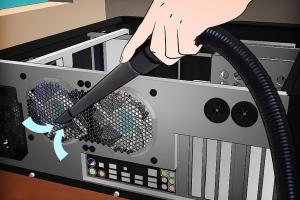Ultimate Guide to Cleaning Your PC: Case, Monitor, Mouse, and Keyboard

-
Quick Links:
- Introduction
- Why Cleaning Your PC is Essential
- Tools and Materials Needed
- How to Clean Your Computer Case
- How to Clean Your Monitor
- How to Clean Your Mouse
- How to Clean Your Keyboard
- Case Studies: The Impact of a Clean PC
- Expert Insights on PC Hygiene
- FAQs
- Conclusion
Introduction
Cleaning your PC is not just about aesthetics; it's a crucial part of maintaining the hardware and ensuring optimal performance. Dust, grime, and other contaminants can accumulate over time, leading to overheating and malfunction. This comprehensive guide will walk you through the steps to clean your computer case, monitor, mouse, and keyboard effectively.
Why Cleaning Your PC is Essential
Neglecting to clean your PC can have serious consequences:
- Overheating: Dust blocks airflow, causing components to overheat.
- Performance Issues: Dirt can impair the performance of fans and other moving parts.
- Shortened Lifespan: Accumulation of dust can lead to hardware failure.
- Hygiene: A dirty workspace can harbor bacteria and allergens.
Tools and Materials Needed
Before you begin, gather the following tools and materials:
- Microfiber cloths
- Canned air or a vacuum with a brush attachment
- Isopropyl alcohol (at least 70%)
- Cotton swabs
- Screwdriver (if necessary for your case)
How to Clean Your Computer Case
Step 1: Power Down and Unplug
Before you start cleaning, ensure your PC is powered down and unplugged to avoid any electrical hazards.
Step 2: Open the Case
Use a screwdriver to remove the side panel of your computer case, exposing the internal components.
Step 3: Dust Removal
Using canned air, blow out dust from the fans, heat sinks, and other components. Be sure to hold the can upright to avoid moisture.
Step 4: Wipe Down Surfaces
Dampen a microfiber cloth with isopropyl alcohol and gently wipe down surfaces, avoiding sensitive components.
Step 5: Reassemble the Case
Once everything is clean, reattach the side panel and plug your PC back in.
How to Clean Your Monitor
Step 1: Power Down
Turn off your monitor and unplug it to ensure safety.
Step 2: Use a Microfiber Cloth
Using a dry microfiber cloth, gently wipe the screen to remove dust and fingerprints. Avoid using paper towels.
Step 3: Cleaning Solutions
If necessary, lightly dampen the cloth with a mixture of water and isopropyl alcohol. Never apply liquid directly to the screen.
How to Clean Your Mouse
Step 1: Disconnect Mouse
Unplug your mouse or turn it off if it's wireless.
Step 2: Wipe the Surface
Use a damp microfiber cloth to clean the exterior surfaces.
Step 3: Clean the Sensor
Use a cotton swab dipped in isopropyl alcohol to clean the sensor area.
How to Clean Your Keyboard
Step 1: Disconnect Keyboard
Unplug your keyboard from the PC.
Step 2: Shake Out Debris
Turn the keyboard upside down and gently shake it to dislodge crumbs and debris.
Step 3: Wipe Down Keys
Use a damp cloth to wipe down the keys and surfaces. For stubborn stains, use a cotton swab with alcohol.
Case Studies: The Impact of a Clean PC
According to a study by the Edrawsoft Research Institute, regular cleaning can enhance performance by up to 30%. Users reported fewer crashes and smoother operation after thorough cleaning sessions.
Expert Insights on PC Hygiene
Experts recommend cleaning your PC at least once every three months. This includes both internal and external components. Regular cleaning not only improves performance but also enhances longevity.
FAQs
1. How often should I clean my PC?
It’s recommended to clean your PC every 3 to 6 months, depending on the environment.
2. Is it safe to use water to clean my monitor?
No, avoid using water directly. Instead, use a damp cloth with a cleaning solution.
3. Can I use household cleaners on my computer?
No, avoid using household cleaners as they can damage surfaces. Stick to isopropyl alcohol.
4. What should I do if my keyboard keys are sticky?
Remove the keys carefully and clean underneath with a damp cloth and alcohol.
5. How can I prevent dust buildup in my PC?
Keep your computer in a clean, dust-free environment and consider using air filters.
6. Is canned air safe for cleaning electronics?
Yes, canned air is safe, but use it carefully to avoid moisture buildup.
7. Should I remove components when cleaning?
Only remove components if you are comfortable doing so. Otherwise, clean around them.
8. Can I use a vacuum to clean my PC?
Use a vacuum with a brush attachment carefully, as static can build up and damage components.
9. How do I clean a laptop compared to a desktop?
The process is similar, but be cautious with the laptop's screen and keyboard to avoid damage.
10. What is the best way to clean dust filters?
Remove the filters and wash them with soap and water. Ensure they dry completely before reinstalling.
Conclusion
Regular cleaning of your PC is essential for maintaining its performance and longevity. By following the steps outlined in this guide, you can ensure that your computer remains in peak condition. Take the time to invest in your technology, and it will reward you with better performance and a longer lifespan.
Random Reads